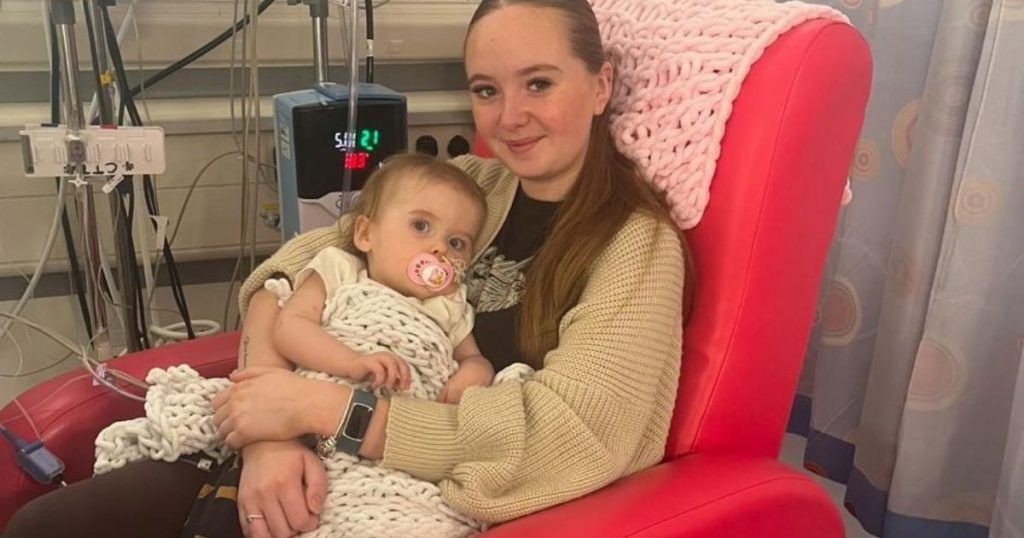A Toddler’s Christmas Wish: A Heart for Willow
Eighteen-month-old Willow Stansfield’s Christmas wish is not for toys or treats, but for the gift of life itself – a new heart. Diagnosed with end-stage heart failure in August, Willow’s young life hangs in the balance as she awaits a heart transplant. What began as a seemingly common childhood virus quickly spiraled into a devastating diagnosis, transforming the Stansfield family’s world into a constant state of anxiety and uncertainty. Willow’s mother, 18-year-old Elisha-Mai, describes the ordeal as a “living nightmare,” a relentless cycle of hope and despair as they navigate the complexities of organ donation and the agonizing wait for a suitable donor.
Willow’s journey began shortly after her first birthday, when she exhibited symptoms resembling a common cold or the flu. Initial consultations with their GP and visits to the Accident & Emergency department resulted in antibiotic treatment, but Willow’s condition continued to deteriorate. An X-ray at North Manchester General Hospital revealed pneumonia, a complication that further jeopardized her fragile health. The search for answers and effective treatment led the family to Alder Hey Children’s Hospital in Liverpool, a specialist center where the devastating diagnosis of heart failure was delivered. Despite the medical team’s best efforts, Willow’s condition worsened, progressing to end-stage heart failure, a critical point where the heart can no longer effectively pump blood throughout the body.
The family was then transferred to the Freeman Hospital in Newcastle, a renowned center for heart transplants, over 150 miles from their home in Bury, Greater Manchester. This geographical separation has added another layer of difficulty for the young family. Elisha-Mai has relocated to Newcastle to be with Willow, while Luke, Willow’s father, makes the arduous weekly journey to see his daughter. The emotional toll of this separation is immense, with Elisha-Mai enduring the week alone while Luke faces the heartbreak of leaving his daughter and partner behind each time he returns home. This physical and emotional distance compounds the already immense strain of their daughter’s critical condition.
As Christmas approaches, the festive season brings a mixture of hope and sadness for the Stansfield family. While they strive to create a sense of normalcy for Willow within the confines of the pediatric intensive care unit, the reality of their situation casts a long shadow over the holiday. The festive cheer is tempered by the knowledge that their daughter’s future remains uncertain, dependent on the generosity of others. They face the stark reality that their Christmas wish is inextricably linked to another family’s profound loss. The very gift they yearn for, a life-saving heart for Willow, would arise from another family’s unimaginable grief.
Elisha-Mai and Luke, thrust into a situation they never imagined, have become passionate advocates for organ donation. They understand the delicate and sensitive nature of the topic but emphasize the profound impact it can have on families like theirs. They appeal to others to have the difficult but crucial conversations about organ donation with their loved ones, recognizing that this single act of bravery can transform lives. They emphasize that they are not waiting for a child to die, but rather for the selfless decision that could save children like Willow who are already facing the most dire of circumstances. A successful heart transplant would give Willow a chance at a normal life, free from the constant threat of her failing heart.
The Stansfield family’s story underscores the critical importance of organ donation. Their plea for a heart for Willow is a poignant reminder of the power of this selfless act. While Willow awaits her life-saving gift this Christmas, her family hopes that their story will inspire others to consider the transformative power of organ donation and the profound impact it can have on the lives of those desperately waiting for a second chance. Their experience serves as a powerful testament to the importance of raising awareness and engaging in open conversations about organ donation, for it is in these conversations that hope and life can blossom from unimaginable loss.


